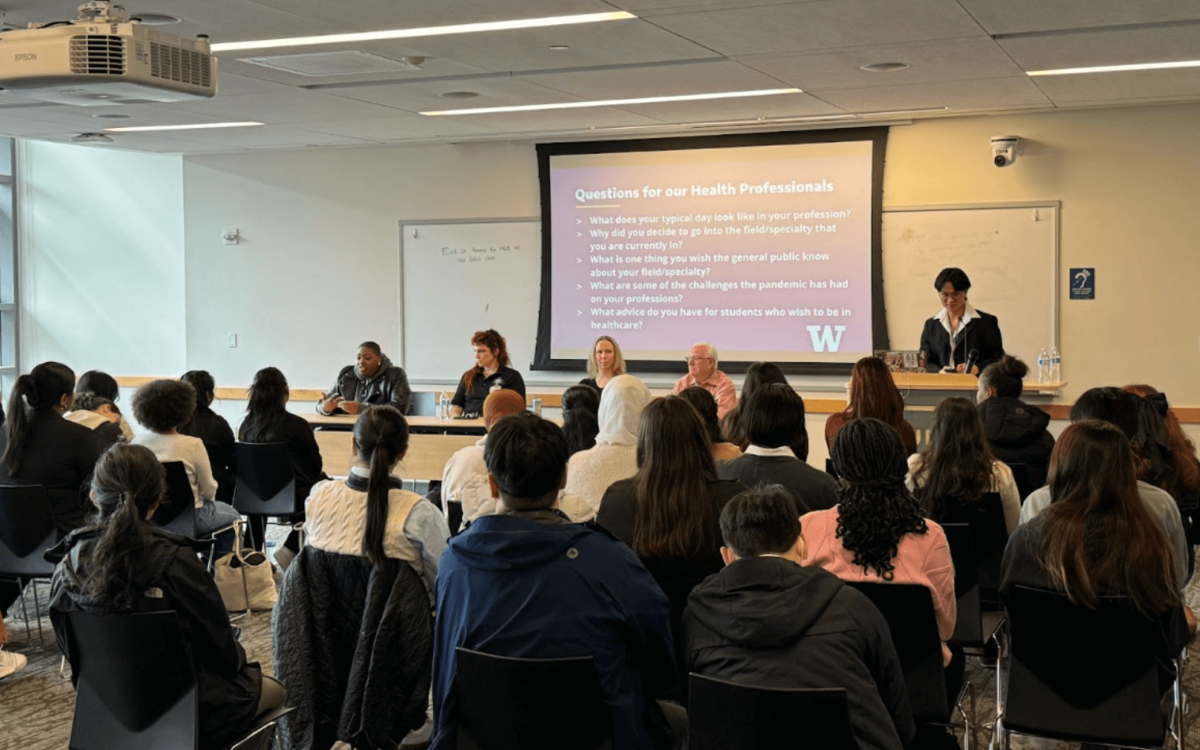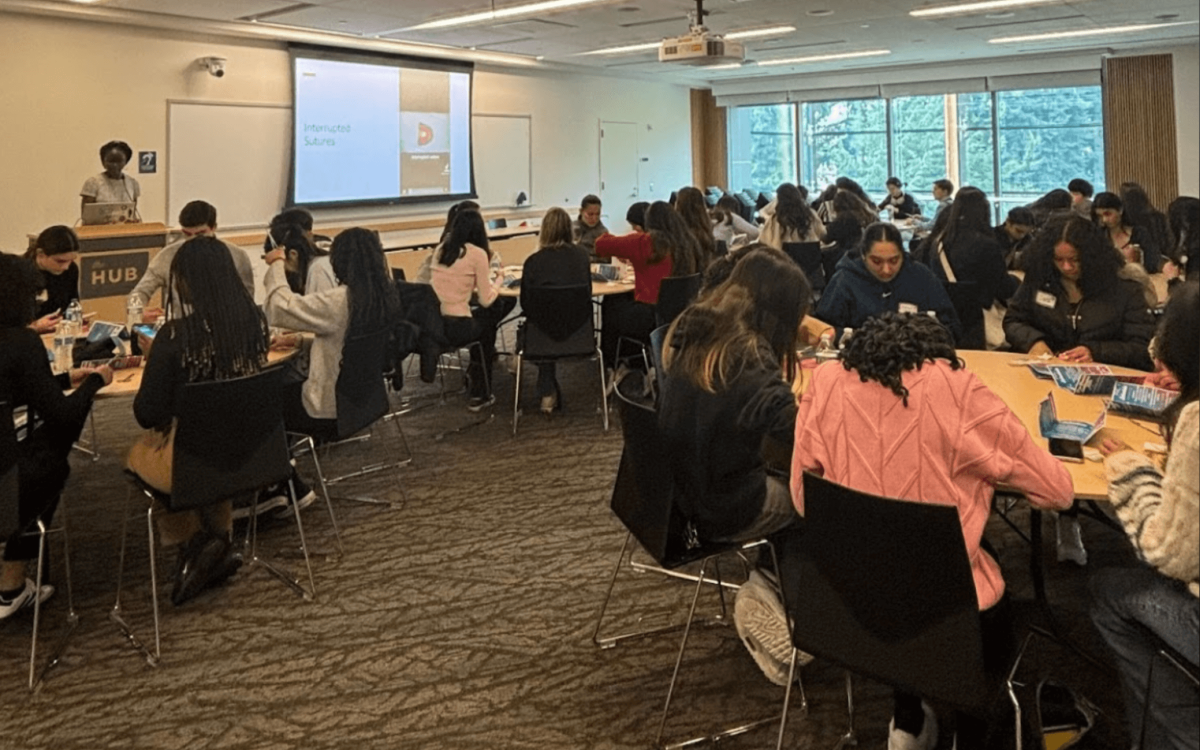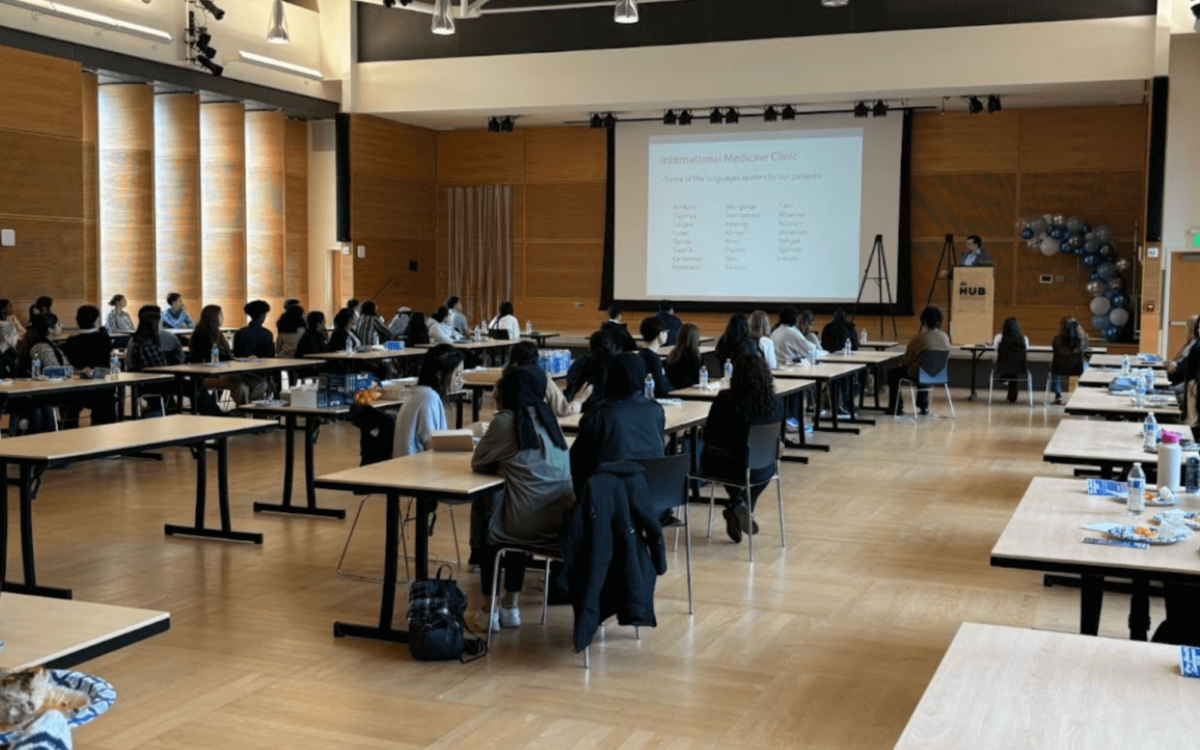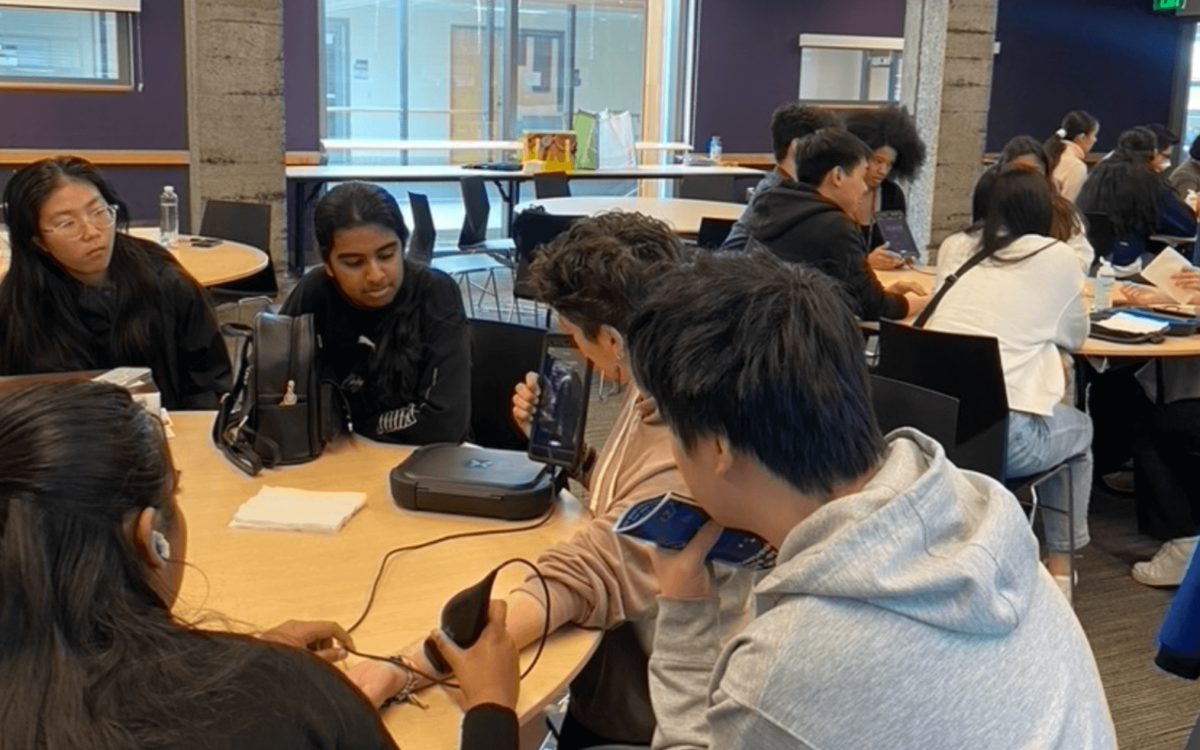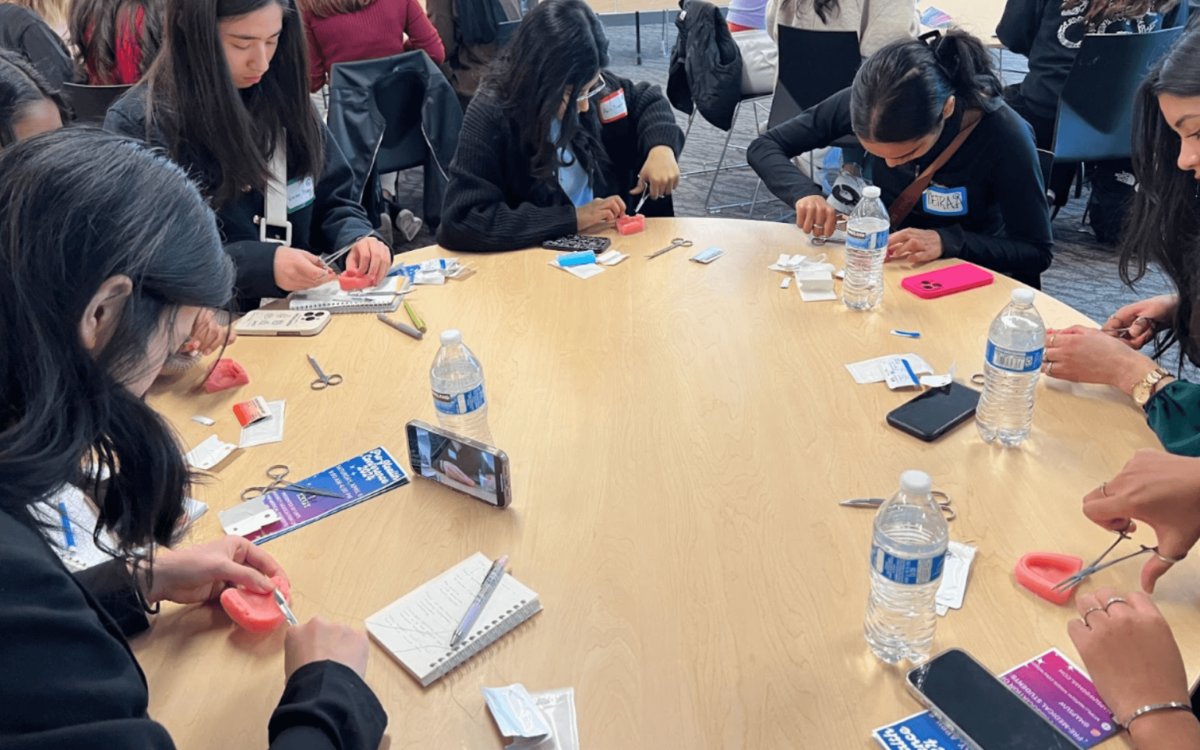At a glance
The 2025 Pre-Health Conference, organized by UW's Minority Association of Pre-Medical Students (MAPS) on April 26, aims to… Read full summary
- Funding received
- 2024-2025
- Mini
- Awarded
- $4,159
- Funding partners
-
- Services and Activities Fee (SAF)
- Website & social links
The 2025 Pre-Health Conference, organized by UW's Minority Association of Pre-Medical Students (MAPS) on April 26, aims to empower underrepresented pre-health students through resources, networking, and healthcare training. Focused on sustainability and health, the event will feature workshops on sustainable medical practices, global health equity, and the environmental impact on marginalized communities, aiming to provide free access and equip future healthcare leaders with the tools for socially and environmentally responsible practice.
The 2025 Pre-Health Conference (PHC), organized by the Minority Association of Pre-Medical Students (MAPS) at the University of Washington, seeks to empower underrepresented pre-health students by providing them with essential resources, networking opportunities, and hands-on experience in healthcare. The event will be held at the Husky Union Building (HUB) on April 26, 2025, and we are applying for funding from the Campus Sustainability Fund (CSF) to cover the room reservation costs.
This conference aligns with the core goals of the CSF by promoting sustainability through education and resource sharing. While the primary focus is on healthcare, the conference will also highlight the intersection of sustainability and health, emphasizing topics like global health equity, sustainable healthcare practices, and environmental health. The event will feature workshops on opioid overdose prevention, hands-on training in sustainable medical practices, and panels addressing social determinants of health that directly relate to environmental impacts on marginalized communities.
The funding from the CSF will be crucial for securing the HUB as the venue, ensuring that this large-scale event is accessible to students and faculty. Without this support, the burden of venue costs could limit our ability to provide free attendance, which is essential to making the conference equitable and inclusive for all students, especially those from underrepresented and marginalized backgrounds.
The project is a continuation of last year’s successful conference, which attracted over 400 attendees, but this year’s event will be expanded to include even more attendees. The partnership with CSF will allow us to scale the event, enhancing its reach and impact across UW’s student community. The CSF has already generously sponsored the PHC in the past, and has allowed for us to provide a high-quality experience focused on equity and access.
With CSF support, we aim to build a lasting model for future PHCs, equipping future healthcare professionals with the knowledge and tools to lead in environmentally conscious and socially responsible ways. Thank you for your consideration!
Tristan Jafari
Project lead
- tjaf@uw.edu
- Affiliation
- Student
- Years
- 1 year(s) remaining at UW
- Affiliated groups
- Minority Association of Pre-Medical Students, American Red Cross @ UW, UW Emergency Medical Services, UW Medicine Diabetes Institute Thaler Lab, Department of Emergency Medicine, UDistrict Street Medicine, Narcare @ UW
Dr. Erik Malmberg
Team member
- edmalmberg@uw.edu
- Affiliation
- Faculty
- Affiliated groups
- UW School of Medicine
Cass Nguyen
Team member
- eccadvs@uw.edu
- Affiliation
- Staff
- Affiliated groups
- Samuel E. Kelly Ethnic Cultural Center
Brendan Chang
Brendan is our SAO Advisor and is supportive of this event. He has been advising, as well as assisting with the planning and organization of this event.
- brech@uw.edu
- Affiliation and department
- UW Student Activities Office
Request amount and budget
Plans for financial longevity
After CSF funding ends, the 2025 Pre-Health Conference will continue to be sustained through the Minority Association of Pre-Medical Students (MAPS) at the University of Washington. The conference has a long history of success, and each year’s organizing team builds upon the previous year’s efforts. Moving forward, the MAPS leadership will continue to rely on established fundraising methods, including sponsorship from external organizations like the Princeton Review and local businesses, as well as internal club resources.
Additionally, any materials produced for the 2025 conference, such as workshop guides and promotional resources, will be preserved and passed down to future organizing teams. These materials provide a strong foundation for the next year’s team, reducing costs and improving quality.
Timeline Overview for 2025 Pre-Health Conference
The 2025 Pre-Health Conference (PHC) is a year-long project with several key milestones leading up to the event on April 26, 2025. The grant from the Campus Sustainability Fund (CSF) will support essential activities such as reserving the venue and ensuring a smooth execution of the conference. Below is a comprehensive timeline of the major activities and deadlines:
July 2024
- Initial Planning: The planning committee is established, and key roles are assigned.
- Sponsorship Outreach Begins: Initial outreach to potential sponsors, including securing venue reservation.
August 2024
- Sponsor Follow-ups: Continue reaching out to sponsors and finalizing committee assignments.
- Advisory Meetings: Initiate contact with ECC/SAO advisors for monthly meetings to guide the planning process.
September 2024
- Workshops Finalized: All workshops and sessions are confirmed by September 27, 2024.
- Speaker Brainstorming: Begin identifying potential keynote speakers and session leaders.
October 2024
- Speaker Outreach: Official invitations to speakers and workshop facilitators.
November 2024
- Intern Recruitment: Open and close applications for PHC 2025 interns, sending acceptance emails by November 22, 2024.
December 2024
- Budget Finalization: Complete the detailed PHC budget by December 15, 2024.
January 2025
- Biweekly Meetings: Begin biweekly planning meetings to monitor progress.
- Logistics Finalization: Confirm ticketing system, catering, and the first round of speakers by January 19, 2025. Start advertising for the conference.
February 2025
- Speaker Confirmation: Finalize all speaker commitments by February 23, 2025.
- Outreach to High Schools and Colleges: Start outreach to local schools and finalize scholarship opportunities by February 10, 2025.
- Order Supplies: Ensure all necessary supplies (e.g., technology converters) are ordered by February 23, 2025.
March 2025
- Weekly Meetings: Transition to weekly planning meetings.
- Advertising Push: Begin a full-scale advertising campaign across social media and the UW campus by March 24, 2025.
- Final Preparations: Finalize and print event materials, including pamphlets, posters, and the day-of schedule. Finalize youth protection and photo consent protocols.
April 2025
- Final Run-through: Hold a final PHC meeting and event run-through between April 18-21, 2025.
- Conference Day: The 2025 Pre-Health Conference will take place on April 26, 2025.
May 2025
- Post-Event Wrap-up: Compile PHC 2025 statistics and present to sponsors and stakeholders by May 9, 2025.
- Recap Meeting: Conduct a final recap meeting to discuss successes and areas for improvement.
Plans for long-term project management
Since its inception, MAPS has maintained a well-established structure for succession planning, ensuring that the event continues to thrive despite the regular turnover of student leaders.
Each year, the outgoing officers provide detailed documentation, including event planning guides, sponsorship contacts, and budgeting templates, to incoming leaders to maintain continuity. Furthermore, roles such as Conference Chair and Treasurer are passed on with careful consideration and mentorship during the transition period, ensuring that the new team is fully equipped to carry the project forward.
The PHC intern program also plays a critical role in developing future leadership. Students who participate as interns gain hands-on experience in managing different aspects of the conference, making them prime candidates to assume leadership roles in subsequent years. This framework has successfully sustained the event's growth year after year, and we are confident in its continued success even after the current organizers graduate.
Problem statement
The 2025 Pre-Health Conference (PHC) addresses the critical need for equitable access to pre-health education and resources for underrepresented students at the University of Washington. Many pre-health students, particularly those from minority or underserved backgrounds, face barriers to accessing career exploration opportunities, mentorship, and hands-on experiences in healthcare. These obstacles limit their exposure to essential knowledge and skills that are crucial for pursuing careers in healthcare.
This project was informed by the lived experiences of MAPS members and ongoing feedback from students who have expressed the need for accessible and inclusive resources tailored to their unique challenges. The PHC aims to fill this gap by providing workshops, panels, and networking opportunities that directly cater to the needs of underrepresented students, empowering them to succeed in their healthcare journeys.
The PHC has successfully addressed these critical needs in previous years, and the 2025 conference will expand on that foundation, ensuring that students from diverse backgrounds can access valuable career development resources and explore various paths in healthcare, regardless of their socioeconomic or educational barriers.
Problem context
The 2025 Pre-Health Conference (PHC) aligns with and complements several existing initiatives at the University of Washington focused on increasing diversity and inclusion in healthcare. As a signature event of the Minority Association of Pre-Medical Students (MAPS), the PHC directly supports UW’s broader mission of fostering a more equitable and inclusive learning environment for underrepresented students. By focusing on providing pre-health students with access to hands-on workshops, career panels, and mentorship opportunities, the PHC strengthens efforts to diversify the future healthcare workforce.
The PHC also complements UW’s programs such as the Office of Minority Affairs & Diversity (OMAD) and Health Equity Circle by amplifying their efforts to support marginalized students. The conference bridges academic resources with real-world healthcare experiences, creating a pipeline of support for students pursuing healthcare careers.
This initiative also works synergistically with ongoing student-driven projects at UW, such as the Harborview Medical Center Student Shadowing program, by providing an annual platform for networking, professional development, and resource sharing. By incorporating perspectives from a diverse range of healthcare professionals, the PHC ensures that pre-health students can engage in collective action to address the barriers they face, ultimately enhancing the overall impact of these initiatives at UW.
Measure the impacts
| Impact / goal | Metric(s) of success | UW stakeholders impacted |
|---|---|---|
| Increased Access to Healthcare Career Development for Underrepresented Students | At least 400 attendees, with 50% identifying as underrepresented in healthcare, attending workshops and panels focused on career development. | Undergraduate |
| Enhanced Professional Networking Opportunities | 35+ healthcare professionals, including medical students, physicians, and faculty, engaged in mentorship and networking activities with attendees during workshops and panels. | Undergraduate |
| Hands-on Learning Experiences in Healthcare | At least 150 students participating in hands-on workshops (e.g., suturing, opioid overdose response), providing valuable practical skills and exposure to healthcare roles. | Undergraduate |
Communication tactics and tools
Our communication strategy for the 2025 Pre-Health Conference will leverage a variety of tactics and tools to maximize reach and engagement within the UW community and beyond. We will use platforms like Instagram, Facebook, and LinkedIn to post regular updates, event highlights, and speaker announcements. Engaging content such as videos, testimonials, and infographics will drive interest and boost event visibility. Targeted email campaigns will be sent to MAPS members, UW pre-health clubs, and affiliated campus organizations. These emails will include event details, registration information, and sponsorship acknowledgments. We will host tabling events on campus to interact with students directly, answer questions, and distribute promotional materials such as flyers and event schedules. We even have dedicated officers whose primary role is to conduct outreach and foster community engagement.
Outreach communication plan
We will utilize a multi-channel communication approach to promote the 2025 Pre-Health Conference and share its impact across the UW community. This includes email campaigns, social media outreach (Instagram, Facebook), and collaborations with campus organizations, such as the Office of Student Health Relations. We will engage with pre-health student groups, underrepresented minority communities, and local high schools. The impacts, including event highlights and success stories, will be shared through MAPS’ social media platforms and the UW student newsletter, ensuring visibility among key stakeholders who will benefit from the conference’s resources and programming.
Student involvement
The 2025 Pre-Health Conference provides numerous opportunities for student professional development. For instance, Seattle Children's hosts a table at the event, where they distribute information for volunteer positions at the hospital for UW students. Additionally, our PHC interns play a critical role in organizing the event, gaining hands-on experience in project management, fundraising, and leadership.
The conference also includes mentorship opportunities, where students can interact with healthcare professionals, medical students, and faculty during workshops and panels. These components equip students with essential skills and connections to support their career development in healthcare, making the conference an invaluable experience for pre-health students.
